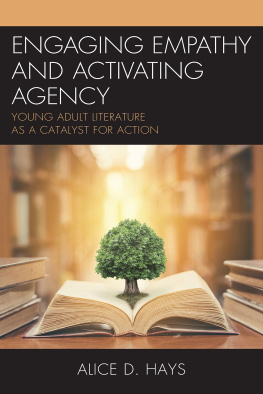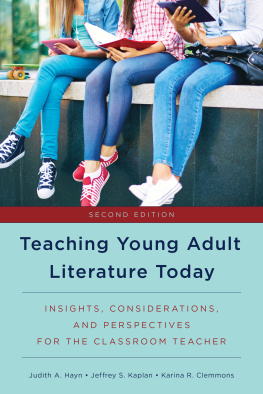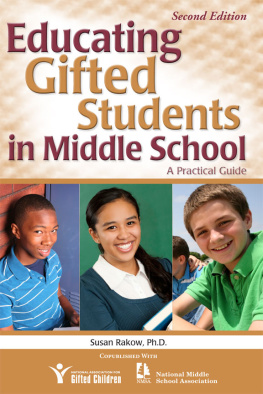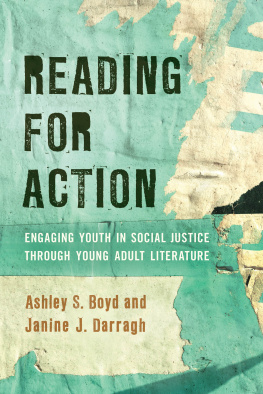Engaging Empathy and
Activating Agency
This book is dedicated to my mother, Shan, and two daughters, Lorisa and Ellie.
Without their editing prowess, emotional support, constant encouragement, and ability to bake their own cookies, this book would not have existed.
Engaging Empathy and
Activating Agency
Young Adult Literature as a
Catalyst for Action
Alice D. Hays
ROWMAN & LITTLEFIELD
Lanham Boulder New York London
Published by Rowman & Littlefield
An imprint of The Rowman & Littlefield Publishing Group, Inc.
4501 Forbes Boulevard, Suite 200, Lanham, Maryland 20706
www.rowman.com
6 Tinworth Street, London SE11 5AL, United Kingdom
Copyright 2021 by Alice D. Hays
All rights reserved . No part of this book may be reproduced in any form or by any electronic or mechanical means, including information storage and retrieval systems, without written permission from the publisher, except by a reviewer who may quote passages in a review.
British Library Cataloguing in Publication Information Available
Library of Congress Cataloging-in-Publication Data
Library of Congress Control Number: 2021932754
ISBN: 978-1-4758-5364-3 (cloth : alk. paper)
ISBN: 978-1-4758-5365-0 (pbk. : alk. paper)
ISBN: 978-1-4758-5366-7 (electronic)
 The paper used in this publication meets the minimum requirements of American National Standard for Information SciencesPermanence of Paper for Printed Library Materials, ANSI/NISO Z39.48-1992.
The paper used in this publication meets the minimum requirements of American National Standard for Information SciencesPermanence of Paper for Printed Library Materials, ANSI/NISO Z39.48-1992.
Contents
Dr. James Blasingame
There are so many people who participated in the creation and development of this book, without whom this book would not have existed. Most critically, the educators who thought my idea sounded interesting and were willing to let me come into their classes and provided feedback for this curriculum.
Thank you, Anthony Celaya, for being willing to be the first guinea pig and giving me access to such brilliant and amazing students who helped me see the potential for what we could do with this.
Thank you to Julie Neff, who not only opened up her classroom doors and her class calendar to my ideas but also inspired me with her own spin and approach to this work. Because of your wise tweaks and additions, this curriculum is ready to share. I appreciate your enthusiasm for every conference proposal I ask you about, and your constant desire to be the absolute best teacher you can be for your students!
Thank you to Christian Muoz and the rest of the Lincoln Junior High seventh grade ELA team! You helped me see how multiple educators might take up this work, and your eagerness to advocate for your students is an inspiration.
And to those individuals who encouraged me and pushed me to just lean forward and keep my feet moving, like Dr. James Blasingame, I owe you the sincerest debt of gratitude! Thank you for supporting my journey as a scholar! Thank you to my work family at California State University, Bakersfield (CSUB) for being unwaveringly supportive and inspirational and to my many writing group partners, most especially Dr. Maria Hernandez-Goff, Dr. Bre Evans-Santiago, and Shan Hays, my earliest editor. And thank you to Dan Shanyfelt for giving me the push to get started. I needed that. Vickie Spanos was always an incredible cheerleader, and never once wavered in her enthusiasm around this work. I so appreciate you making me feel at home in the Bakersfield community! Thank you to all of my family who inspires me to want to make the world a better place. A special thanks to Ellie and Lorisa for being such amazing children that I was able to do this work, almost guilt free!
Finally, thank you to my own Gilbert High School students. They willingly dove into the earliest renditions of this work and showed me the value and importance of giving students voice. It is through you that I truly learned how incredible, intelligent, and worldly young adults can be when given the choice to use their education experience to make the world a better place. You give me hope for a brighter future! And teachers who provide these opportunities for these studentsthank you! You are making the world a little bit better through your guidance.
Dr. James Blasingame
Dr. Alice Hays has always been a passionate teacherpassionate about her subject matter, passionate about her teaching methods, and most importantly, passionate about her students. As a high school English teacher, she was much beloved by students and parents for her attention to every students needs, and much respected by her colleagues and school administrators for her devotion to staying up-to-date on teaching and learning research and practice. She was adept at inciting passion among her students for learning, which resulted in literacy proficiencies that helped to put her school at the top of performance measures in the state. Every year at the Arizona English Teachers Association Convention, teachers would flock to her presentations on how she was implementing new literacies, global education, young adult literature, and new technologies.
Perhaps greatest of all her passions revolved around students learning literacy skills designed to serve them well in real lifeskills that would empower them to choose their own path in life and to make the world a better place. This book is all about that very thing: empowering students to make the world and their own lives better through curriculum and instruction that will help them in their life journeys, whether that be medicine or law, engineering or construction, civil service or military, or social work or education, whatever path they choose to take. Developing imagination about a world and life that could be, personal agency, and commitment to purpose are at the center of identified student goals in this book.
Real-world literacy requires reading, writing, and research curriculum for the 2020s. Research always begins with questions, sometimes hard questions, and secondary students already have so many. Why do so many of our peers commit suicide, and what can we do about it? Why do so many young soldiers face such difficulty in returning to civilian life, and how can we help? Why is bullying so prevalent in our society, and what can we do about it? Why does our state rank forty-sixth in the nation for childhood well-being? Young people can feel powerless in a world they see as damaged, but feelings of helplessness morph into feelings of empowerment and, in the end, productive action using Dr. Hayss curriculum. Encourage them to follow their hearts, she says (page 33), provide them with the tools they need, and guides them in the areas they need help.
The old school research paper unit has students looking up preapproved topics in the school or public library electronic card catalog, following the usual steps to create notecards, thesis statements, pro and con arguments, and conclusions, and finally writing the usual, predictable, formulaic final paper. Quite the opposite, Dr. Hays begins with the most powerful activity that can be done in classfiction reading. A book is a powerful thing, and studies clearly show that reading self-selected fiction is not only one of the fastest ways to improve reading skills, but it also has a measurable effect on the ability to empathize with other human beings, especially those who come from a life very different from the readers (Skinner 2016). As former director of the Beverly Hills Library and past president of the Young Adult Library Services Association says, You can give a young reader statistics on alcoholism in dysfunctional families, but if you want them to understand how it feels to be in that family, give them the young adult (YA) novel Make Lemonade , by Virginia Euwer Wolf. Empathy makes us human and inspires us to help our fellow human beings.







 The paper used in this publication meets the minimum requirements of American National Standard for Information SciencesPermanence of Paper for Printed Library Materials, ANSI/NISO Z39.48-1992.
The paper used in this publication meets the minimum requirements of American National Standard for Information SciencesPermanence of Paper for Printed Library Materials, ANSI/NISO Z39.48-1992.